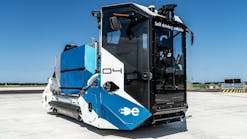Future-Proofing Airports: Adopting Smart Charging for Operational Excellence
As airports worldwide strive to meet the growing demands of modern aviation while adhering to stringent environmental regulations, adopting smart charging technologies for ground support equipment (GSE) has become a pivotal strategy.
Future-proofing airport operations by integrating these advanced solutions not only enhances operational efficiency but also significantly reduces carbon footprints. Here are the benefits and implementation of smart charging technologies, highlighting how they pave the way for operational excellence in the aviation industry.
The Growing Need for Smart Charging Solutions
Airports are complex ecosystems with numerous moving parts, and the seamless operation of GSE is crucial for maintaining smooth and efficient workflows.
Powered by diesel or gasoline, GSE has been a major contributor to high operational costs and environmental degradation at airports. The shift to electric GSE (eGSE) presents a viable solution to these challenges, offering both economic and environmental benefits.
However, the transition requires robust and intelligent charging infrastructure to ensure the reliability and efficiency of eGSE fleets.
Enhancing Operational Efficiency
Smart charging technologies are designed to maximize the performance of eGSE operations. High-efficiency chargers deliver maximum power transfer with minimal energy loss, reducing the time eGSE units spend charging and increasing their availability for operational use.
This rapid charging capability is particularly beneficial during peak hours when the demand for GSE is highest, ensuring that all equipment is ready and operational when needed.
Remote management and monitoring capabilities further enhance operational efficiency. Airport operators can oversee and control charging processes in real-time, making adjustments as needed to optimize performance.
Real-time alerts and diagnostics enable swift identification and resolution of issues, minimizing downtime and ensuring the continuous operation of eGSE fleets.
Cost Savings and Environmental Benefits
Adopting smart charging technologies also leads to substantial cost savings. Efficient charging reduces energy consumption, directly translating to lower operational costs. Additionally, the ability to manage and optimize energy use through features like peak shaving and demand response programs further reduces energy expenses and supports grid stability.
The environmental benefits are equally significant. By transitioning to eGSE and implementing smart charging solutions, airports can drastically reduce their carbon emissions. This not only helps in meeting regulatory requirements but also enhances corporate social responsibility by contributing to global sustainability goals.
Implementing Smart Charging Technologies
The successful implementation of smart charging technologies requires a strategic approach, encompassing assessment, planning and execution. Here are key steps to ensure a seamless transition:
Assessing Current Infrastructure
Before integrating smart charging solutions, airports must conduct a thorough assessment of their existing infrastructure. This involves evaluating the current state of GSE fleets, energy consumption patterns and the capacity of existing charging stations. Understanding these factors is crucial for designing a tailored solution that meets the specific needs of the airport.
Strategic Planning and Investment
Based on the infrastructure assessment, airports should develop a strategic plan outlining the goals, timelines and budget for implementing smart charging solutions. This plan should include key performance indicators (KPIs) to measure the success of the implementation and ensure continuous improvement. Investment in high-quality, reliable charging equipment is essential for long-term success.
Training Staff
Training staff on the new technologies is critical for maximizing the benefits of smart charging solutions. Airport operators, ground handlers and maintenance teams need to be well-versed in the functionalities and advantages of the new systems. Proper training ensures that the staff can effectively manage and troubleshoot the equipment, leading to smoother operations and reduced downtime.
Engaging Stakeholders
Engaging stakeholders throughout the implementation process is essential. This includes working with partners, regulatory bodies and other relevant parties to ensure the project aligns with broader operational and compliance goals. Stakeholder engagement helps in gaining support and cooperation, which is crucial for the successful integration of new technologies.
Advanced Features of Smart Charging Solutions
Real-Time Data and Analytics
One of the most impactful features of smart charging solutions is the ability to provide real-time data and analytics.
This functionality offers detailed insights into energy consumption, charging efficiency and overall system health. By leveraging this data, airport operators can make informed decisions, optimize charging schedules and predict maintenance needs, thereby ensuring the continuous and efficient operation of eGSE fleets.
Predictive Maintenance
Smart charging solutions equipped with predictive maintenance capabilities can significantly reduce unexpected downtimes. These systems continuously monitor the health and performance of batteries and charging infrastructure, identifying potential issues before they lead to failures.
By addressing maintenance needs proactively, airports can ensure that their eGSE remains operational and reliable, thus maintaining smooth operations.
Energy Management Systems
Energy management is a critical aspect of smart charging technologies. Advanced energy management systems enable airports to optimize their energy usage through smart-grid integration, peak shaving and demand response programs.
These features help in reducing energy costs, improving grid stability and minimizing the environmental impact of airport operations. By efficiently managing energy resources, airports can achieve greater sustainability and operational efficiency.
Pioneering Smart Charging Solutions in Aviation
Advanced Charging Technologies (ACT) is transforming airport operations with innovative charging solutions that enhance efficiency and sustainability. With over 68,000 Quantum chargers deployed globally, ACT supports the essential shift to eGSE by addressing key needs like energy management, battery monitoring and fleet optimization. The chargers are patented, NEMA 3R Outdoor Rated, and certified to UL, cUL, CE and RCM standards, ensuring reliable performance in demanding environments.
ACT’s centralized fleet management platform provides real-time data on energy use and battery health, enabling airport operators to make informed decisions for smoother, more efficient operations. With smart-grid integration and peak shaving programs, airports can reduce energy costs, improve grid stability and lower their environmental impact. By integrating advanced technologies, airports are better equipped to future-proof their operations and achieve net-zero sustainability goals.
The Future of Airport Operations
Future-proofing airport operations through the adoption of smart charging technologies is essential for achieving operational excellence and sustainability. As the aviation industry continues to evolve, the integration of intelligent charging solutions will play a crucial role in enhancing efficiency, reducing costs and minimizing environmental impact. Airports that embrace these advanced technologies will be better equipped to meet the challenges of the future, setting new standards for operational performance and sustainability in the aviation sector.
Ultimately, the adoption of smart charging solutions is a crucial step towards future-proofing airport operations. By investing in advanced technologies and fostering collaboration between stakeholders, airports can achieve operational excellence, reduce costs and support global sustainability efforts. The future of aviation is green, and smart charging solutions are leading the way.










